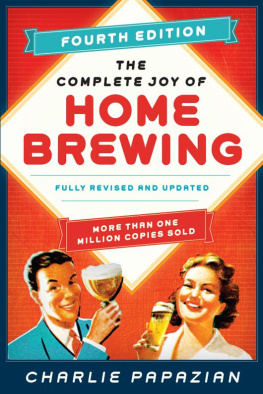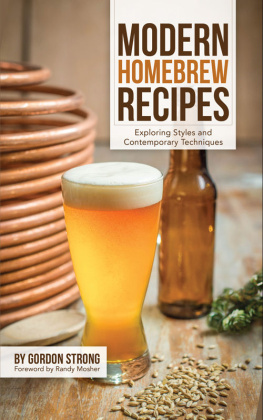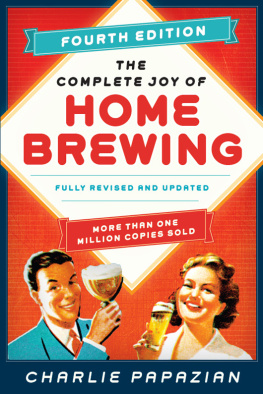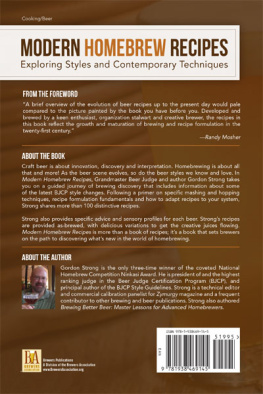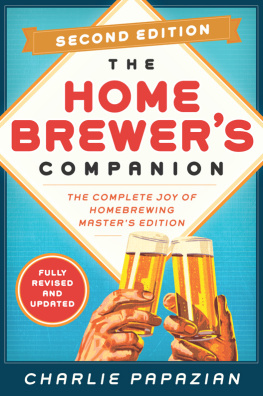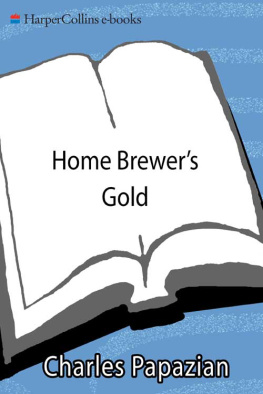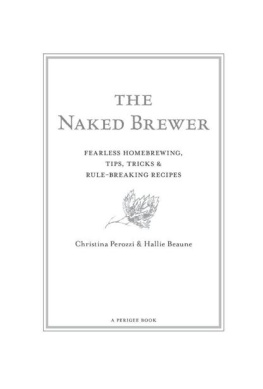The Homebrewers Companion is dedicated to homebrewers throughout America. They have inspired an American and international renaissance in brewing and a respect for beer.
I especially thank the following people who have helped make this book possible: Chris Miller, my editor of over ten years at Avon Books, for her support and enthusiasm for my work. Michael Jackson as a friend and for his unparalleled dedication, furthering international awareness of beer and brewing and lending me continued insight and assistance. Tracy Loysen as a friend who has helped extract creativity, clarity and insight with my work and with this book. Michael Saunders and Gina Truex for being there as great friends before, during and after my abeyance with writing this book. To my friends and colleagues at the Association of Brewers for putting up with my dispositions while juggling many projects at once. And my parents, Aram and Lucy, whove had the patience to let me stumble into and enjoy whatever Ive become and never wouldve thunk it.
by Professor Michael J. Lewis
I have never homebrewed, though Ive been around homebrewing a long time. I first seriously observed the sport in the days of Pabst Blue Ribbon malt extract plus four pounds of sugar and bakers yeast. They were rough and ready times. Homebrewers consumed their product, of course, if they got to it before it exploded into the butter, but Im not sure they could ever relax and have a homebrew! In those daysthe early 1960sI was already brewing at the University of California at Davis on a rather sophisticated 5-gallon pilot-scale brewery as part of my teaching and research responsibilities, and I began to use that experience to teach courses about the homebrewing art. I like to think those courses made a difference, and of course, our university extension program has grown hugely since then, but nothing can compare to the sea change in the life of homebrewers wrought by Charlie Papazian and the Association of Brewers and its numerous offshoots, including the American Homebrewers Association and Brewers Publications. This book adds to Charlies incomparable contribution to the field.
Homebrewers are among my favorite people. They have a passion for beer and brewing that few other groups can match, and a thirst for information that borders on the fanatic. Ideas are rapidly taken up and tried, and stand or fail on their intrinsic value; and information travels quickly. We now teach homebrewing to a very different clientele than formerly: The passion and fascination remain the same, but the level of sophistication is much higher now than before, and so are the expectations for success. So is the willingness to invest in equipment and knowledge and good raw materials, such that there is very little these days the determined homebrewer cannot achieve. Charlie Papazian wrote this book with such homebrewers in mind. Any book is a compendium of what an author knows, what he has read and learned, what his experience has taught him, and how he thinks and what he thinks about. Charlie excels in all of these categories and brings it all to this book.
Homebrewing is a hobby like any other, in which one needs to invest time and money and thought; but that is where similarities end. Homebrewing is not stamp collecting or bird-watching, because there is an actual end product that meets the creative needs of an individual. One might say the same is true of arts or sports hobbyistsbut surely amateur musicians or painters or golfers must inevitably fall so far short of satisfying their own expectations that their hobbies must be more frustration than satisfaction. Its different for homebrewers. Homebrewers, perhaps, are more akin to those whose hobby is cooking or quilting or some other useful pastime. But even here the analogy is not exactafter all, one must eat and stay warm whether the meal is from scratch or Stouffers. A homebrewer (oddly) makes something that can totally satisfy his or her need to create and yet can be entirely done without; it therefore qualifies as an act of loveself-love, perhaps, but love nevertheless.
Is that why the hobby generates the kinds of passions and enthusiasms that it does? Why do people homebrew? Many years ago there was some legitimacy to the argument that one could choose between Budweiser on the one hand, and homebrew or perhaps imports on the other. These days the commercial brewing industry (including the microbrewery and brewpub industry) provides such an extraordinary range of beers that it seems hard to justify homebrewing on the basis that ones sensory expectations cannot be met somewhere between Budweiser and Big Foot. But the naissance of the microbrewing industry, far from preempting the homebrew hobby, seems to have acted as a spur to it. Though more and more people can now enjoy without much effort a wide range of beer products, for some odd reason they want to make these products for themselves or they want to further expand on what is available.
The dollar cost of specialty beers (including microbrewed products) might be some spur to homebrewing, but I dont meet many poor homebrewers. Most homebrewers are clearly in it for fun and pleasure, and saving a buck is of secondary importanceat best a thin disguise akin to a fly fisherman justifying his sport by the price of fish. No! Homebrewers just enjoy making beer, enjoy tasting the beer they make, delight in reaching out through these ancient processes to centuries of craft brewers who went before, are fascinated by the technology, history and science of the craft, and love to meet others with the same passion. Homebrewing is intriguing and its fun, and this book will add to both aspects of the hobby.
Making beer at home no longer need be a hit-or-miss operation, and an excellent presentation is not only achievable but expected. All homebrewers should know precisely how they made a beer and exactly what they would do in practical terms to improve or change it. Once a beer has been improved to the point where it satisfies the taste buds of its creator, the brewer should then be able to reproduce that beer at will. Though slavish consistency is not a necessary part of homebrewing, I have never quite understood the point of making a different beer at every brewing. Surely a brewer should work steadily and logically at improving a few beers that each meet a particular desired taste profile; without this logical and developmental approach, every brew is a crapshoot. Though Charlie offers many recipes in this book, they are (or should be) beers he likes best; that is a useful starting place for making those you like best.
I have never much enjoyed the company of those homebrew aficionados who crave original gravity without good purpose and who worship excessive consumption of alcohol, or those who never tasted a beer they didnt like (except any domestic major) or boast loudly of beer-drinking feats extraordinaire in places far away and of products curious. I prefer the company (and usually the beers) of those who realize that beermaking and beer drinking are a matter of taste. Its not a macho thing. Its okay not to like some beers; its okay to eschew bitterness/blandness; its okay not to like black beer, or brown or pink; its okay to know what you like and to say so. Its not okay to discount others preferences, however extreme or peculiar or ordinary they might be. And its okay not to win prizes. The crucial essence of homebrewing demands you make exactly what you individually like best, and appreciate what you create and have fun while doing both. This puts a premium on informationhence this book.
Homebrewers dont like too much bad beer happening too oftenit costs money and time and effort and occasionally damnable pride. In my experience folk can only relax and have a homebrew if the beer tastes good and tastes the way the brewer intended. Thats why we now teach nine homebrew courses each year, and why I heartily welcome this new book.


